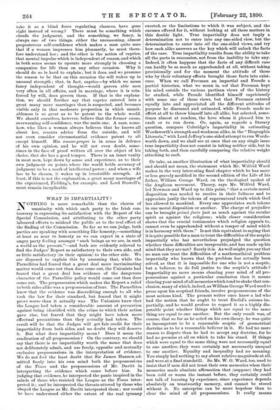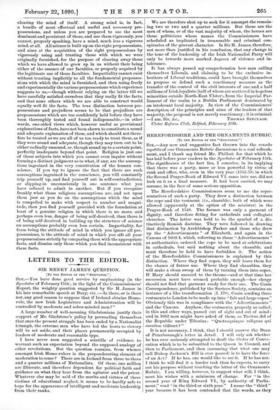WHAT IS IMPARTIALITY?
NOTHING is more remarkable than the chorus of unanimity with which each party to the Irish con- troversy is expressing its satisfaction with the Report of the Special Commission, and attributing to the other party laboured efforts to mislead the public as to the real effect of the finding of the Commission. So far as we can judge, both parties are speaking with something like honesty,—something at least as near to honesty as we can expect in a state of angry party feeling amongst " such beings as we are, in such a world as the present,"—and both are evidently relieved to find the Judges' Report so satisfactory to their own side, and so little satisfactory (in their opinion) to the other side. We are disposed to explain this _ by assuming that, while the Parnellites had feared that a great deal more incriminating matter would come out than does come out, the Unionists had feared that a great deal less evidence of the dangerous character of the Parnellite policy would come out than does come out. The prepossession which makes the Report a relief to both sides alike was a prepossession of fear. The Parnellites knew that the evidence was discrediting enough to all who took the law for their standard, but feared that it might prove worse than it actually was. The Unionists knew that the League had taken a considerable amount of precaution against being identified with the crime to which their action gave rise, but feared that they might have taken more effectual precautions than they actually had taken. The result will be that the Judges will get fair credit for their impartiality from both sides, and no doubt they will deserve it. But what does impartiality mean ? Does it mean the eradication of all prepossession ? On the contrary, we should say that there is no impartiality worth the name that does not deliberately admit, and use freely, opposite and mutually exclusive prepossessions in the interpretation of evidence. We do not feel the least doubt that Sir James Hannen ad- mitted freely into his own mind both the prepossessions of the Times and the prepossessions of Mr. Davitt in interpreting the evidence which came before him. In judging that evidence, he interpreted the panic inspired in the minds of those who resisted the League as the Times inter- preted it ; and he interpreted the threats uttered by those who obeyed the League as Mr. Davitt interpreted them ; nor could he have understood either the extent of the real tyranny
exerted, or the limitations to which it was subject, and the excuses offered for it, without looking at all these matters in this double light. True impartiality does not imply a determination not to enter into any one-sided view, but the determination to enter into all the one-sided views, and try how each alike answers as the key which will unlock the facts of the case. True impartiality results from the ability to take all the parts in succession, not from the inability to take any. Indeed, it often happens that the facts of any difficult case can hardly be so much as apprehended at all, without taking provisionally and for the moment the attitude of those who by their voluntary efforts brought those facts into exist- ence. When we call Freeman an impartial and Fronde a partial historian, what we mean is, not that Freeman kept his mind outside the various partisan views of the history he studied, while Fronde identified himself capriciously with some one of those views, but that Freeman entered equally into and appreciated all the different attitudes of purpose be discussed and estimated, while Fronde made no effort at all to throw himself into all alike, but selected, some- times almost at random, the hero whom it pleased him to exalt or to run down. Or, again, as regards a literary question, compare Coleridge's impartiality in estimating Wordsworth's strength and weakness alike, in the " Biographia Literaria," with Lord Jeffrey's one-sided attempt to run Words- worth down, and we shall see at once that on any single issue true impartiality does not consist in taking neither side, but in taking both, and then carefully comparing the relative weight attaching to each.
Or take, as another illustration of what impartiality should and should not mean, the statement which Mr. Wilfrid Ward makes in the very interesting final chapter which he has more or less gravely modified in the second edition of the Life of his father, William George Ward, on the theological upshot of the Anglican movement. Theory, says Mr. Wilfrid Ward, led Newman and Ward up to this point, " that a certain moral disposition was needed to receive in their fullness and to appreciate justly the tokens of supernatural truth which God has allowed to mankind. Every one appreciates such tokens in one moral disposition or another. The charge of prejudice can be brought prima facie just as much against the secular spirit as against the religions ; while closer consideration shows that the crucial testimonies which religion appeals to, cannot even be apprehended without a temper of mind which is in harmony with them." Is not this equivalent to saying that it is quite possible for a man to treat the difficulties of the sceptic impartially who hail nevertheless prejudged the question whether those difficulties are insuperable, and has made up his mind that they are not? Surely it is. As well might you say that no man can treat the difficulties of a mathemathical problem impartially who knows that the problem has actually been solved, as that it is impossible for one who is not a sceptic, but a believer, to do full justice to the sceptic's attitude ? Impartiality no more means clearing your mind of all pre- possessions against a particular conclusion than it means clearing your mind of all memories which tend to shake that con- clusion, many of which, indeed, as William George Ward used to press upon his sceptical friends, involve prepossessions of the most serious kind. The present writer once knew a lad who had the notion that he ought to treat Euclid's axioms im- partially, and be would profess to regard it as a highly dis- putable point whether things which are equal to the same thing are equal to one another. But the only result was, of course, that so far as he acted on his own theory, he was quite as incompetent to be a reasonable sceptic of geometrical doctrine as to be a reasonable believer in it. He had no more reason to dispute than he had to accept any doctrine, for he had no premiss at all on which to take his stand. If things which were equal to the same thing were not necessarily equal to one another, they were certainly not necessarily unequal to one another. Equality and inequality had no meaning. You simply had nothing to say about relative magnitude at all, and were at a final standstill. So Mr. W. G. Ward, too, used to insist that if men did not trust their own memories when their memories made absolute affirmation that (suppose) they had been cold or warm the instant before, they certainly could not talk of learning by experience, since experience depends absolutely on trustworthy memory, and cannot be stored without it. No enterprise can be more hopeless than to clear the mind of all prepossessions. It really means clearing the mind of itself. A strong mind is, in fact, a bundle of most effectual and useful and necessary pre- possessions, and unless you are prepared to use the most -dominant and persistent of these, and use them vigorously, you cannot, properly speaking, have a mind, much less a vigorous mind, at all. All science is built up on the right prepossessions, and aims at the acquisition of the right prepossessions by vigorously using and trusting those with which we were originally furnished, for the purpose of clearing away those which we have allowed to grow up in us without their being -either of the essence of our faculties, or properly acquired by the legitimate use of those faculties. Impartiality cannot exist -without trusting implicitly to all the fundamental preposses- sions with which the mind is furnished, and then using freely and experimentally the various prepossessions which experience suggests to us,—though without relying on the latter till we have carefully satisfied ourselves that they really fit the facts, and that none others which we are able to construct would -equally well fit the facts. The true distinction between pre- possessions and prejudices seems to be that prejudices are prepossessions which are too confidently held before they have been thoroughly tested and found indispensable,—in other -words, one-sided views which, however useful as provisional -explanations of facts, have not been shown to constitute a sound and adequate explanation of them, and which should not there- fore be treated as we are all of us too ready to treat them, as if they were sound and adequate, though they may turn out to be either radically unsound, or, though sound up to a certain point, perfectly inadequate beyond that point. Religion is just one of those subjects into which you cannot even inquire without forming a distinct judgment as to what, if any, are the assump- tions ingrained in the very constitution of the human con- science. If you try to ignore the fact that there are such Assumptions ingrained in the conscience, you will constantly trip yourself up, and find yourself out in self-contradictions, or slipping-in unconsciously in one sentence what you have refused to admit in another. But if you recognise frankly what those religious assumptions are, and act upon them just as you do on the assumptions which the mind is compelled to make with respect to number and magni- tude, then you find yourself provided with the foundation at least of a genuine religion in which there is no more, and perhaps even less, danger of being self-deceived, than there is of being self-deceived in building up the structure of science on assumptions probably even less certain. Impartiality, far from being the attitude of mind in which you ignore all pre- -possessions, is the attitude of mind in which you sift all your -prepossessions strictly by comparing them with the appropriate facts, and dismiss only those which you find inconsistent with these facts.







































 Previous page
Previous page